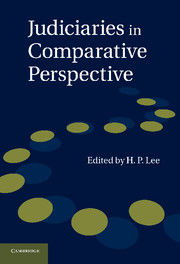Book contents
- Frontmatter
- Contents
- Contributors
- Foreword
- Preface
- Table of cases
- Table of statutes
- Part I
- Part II
- Part III
- Part IV
- Part V
- 20 Judges and non-judicial functions in Australia
- 21 The impact of extra-judicial service on the Canadian judiciary
- 22 Judges and the non-judicial function in New Zealand
- 23 Judges and non-judicial functions in South Africa
- 24 Judges and non-judicial functions in the United Kingdom
- 25 Judges and non-judicial functions in the United States
- Part VI
- Index
- References
22 - Judges and the non-judicial function in New Zealand
from Part V
Published online by Cambridge University Press: 07 September 2011
- Frontmatter
- Contents
- Contributors
- Foreword
- Preface
- Table of cases
- Table of statutes
- Part I
- Part II
- Part III
- Part IV
- Part V
- 20 Judges and non-judicial functions in Australia
- 21 The impact of extra-judicial service on the Canadian judiciary
- 22 Judges and the non-judicial function in New Zealand
- 23 Judges and non-judicial functions in South Africa
- 24 Judges and non-judicial functions in the United Kingdom
- 25 Judges and non-judicial functions in the United States
- Part VI
- Index
- References
Summary
New Zealand has a population of 4.4 million people and is one of the world’s oldest democracies. New Zealand’s population is diverse: 78 per cent European ethnicity; 15 per cent Maori, the indigenous people; 6.6 per cent Asian; and 6.5 per cent Pacific peoples. Its British heritage ensured that New Zealand enjoyed strong judicial institutions from the beginning, very much in the tradition of the common law. In 2010 there were almost two hundred permanent judges in the New Zealand judiciary, a quantity that seems generous given the size of the population. But there does exist an elaborate court structure with generous rights of appeal. Furthermore, New Zealand has at present about 11,000 lawyers with current practising certificates, providing one lawyer for approximately every four hundred people. New Zealand has a mature legal system with a strong tradition of the rule of law.
Any analysis of the New Zealand Constitution and the place of the judiciary within it must start with the Constitution Act 1986. This ordinary statute is perhaps the most important constitutional law New Zealand has, although it lacks many of the features of constitutions in other countries. The Constitution Act can be amended by an ordinary Act of Parliament. Further, it provides little guidance on the rules and principles under which government will be conducted.
- Type
- Chapter
- Information
- Judiciaries in Comparative Perspective , pp. 452 - 473Publisher: Cambridge University PressPrint publication year: 2011



